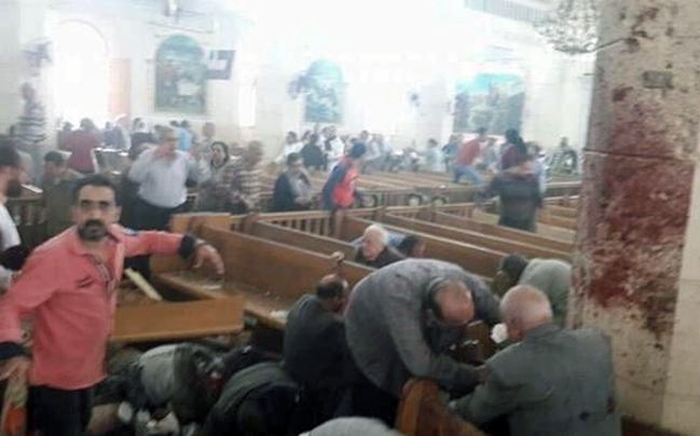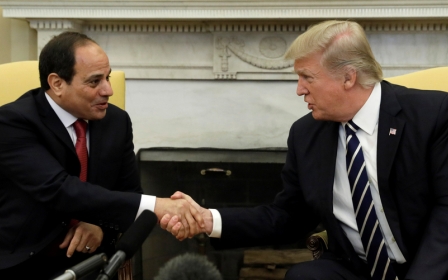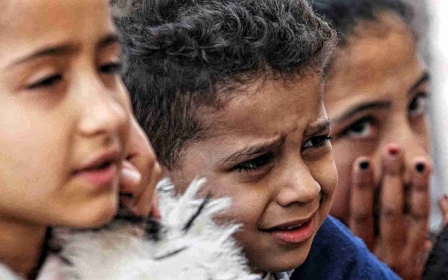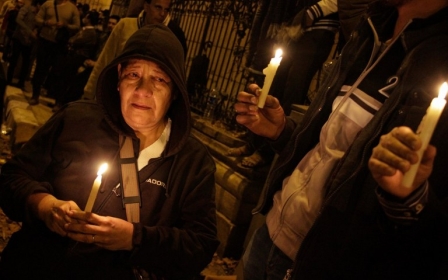Egypt church blasts: Dozens killed as bombs hit Palm Sunday services

At least 44 people were killed and scores wounded in bomb blasts at two churches in northern Egypt as worshippers gathered for Palm Sunday mass, in the latest attacks on Egypt's Coptic Christians.
Both bomb blasts were claimed by the Islamic State group via their Amaq news agency.
The first blast hit the St George's church in the Nile Delta city of Tanta, 120km north of Cairo, killing 27 and wounding about 78 others as hundreds attended a service.
Seventeen people were killed and 40 wounded in a second blast hours later outside Alexandria's St Mark's cathedral, the seat of the Coptic pope Tawadros II.
Egyptian state security said a suicide bomber caused the explosion in Alexandria, where Tawadros had given a service hours before.
Pictures on social media showed dead and the injured among shattered church pews in Tanta.
Thousands gathered outside the church in Tanta shortly after the blast, some wearing black, crying, and describing a scene of carnage.
"There was blood all over the floor and body parts scattered," said a Christian woman who was inside the church.
"There was a huge explosion in the hall. Fire and smoke filled the room and the injuries were extremely severe," another Christian woman, Vivian Fareeg, said.
The Egyptian foreign ministry launched the "United On Palm Sunday" hashtag on Twitter, and called for solidarity "in the face of terrorism".
Ministry spokesman Ahmed Abu Zeid said: "Terrorism hits Egypt again, this time on Palm Sunday. Another obnoxious but failed attempt against all Egyptians #united_on_PalmSunday".
Pope Francis, who is due to visit Egypt this month, condemned the blast.
"I pray for the dead and the victims. May the Lord convert the hearts of people who sow terror, violence and death and even the hearts of those who produce and traffic in weapons," he said.
Images posted online showed some of the injured in Tanta being treated at a nearby mosque.
Palm Sunday is one of the holiest days of the Christian calendar, marking the triumphant entrance of Jesus to the city of Jerusalem.
Copts, who make up about one tenth of Egypt's population of more than 92 million and who celebrate Easter next weekend, have been targeted by several attacks in recent months.
Christians have felt increasingly insecure since the rise of IS across the region.
"Of course we feel targeted, there was a bomb here about a week ago but it was dismantled. There's no security," said another Christian woman in Tanta, referring to an attack earlier this month near a police training centre that killed one policeman and injured 15.
A spate of attacks in Egypt's restive Sinai Peninsula, including the murder of a Copt in the city of el-Arish whose house was also burned, have led some Coptic families to flee their homes.
About 250 Christians took refuge in the Suez Canal city of Ismailiya after IS released a video in February calling for attacks on the religious minority.
In December, a suicide bombing claimed by IS killed 29 worshippers during Sunday mass in Cairo.
In 2015, 21 Egyptian Christians working in Libya were killed by the group.
Egypt's army is waging a counter-insurgency against IS affiliate in Sinai, which has claimed scores of attacks against police and army positions.
President Abdel Fattah al-Sisi, who as army chief helped the military to remove Morsi, defended his security forces against the targeting of Christians.
"[The attacks aim to] destabilise the fabric of Egypt... to give the impression that one group isn't protected as it should be," Sisi said at the time.
New MEE newsletter: Jerusalem Dispatch
Sign up to get the latest insights and analysis on Israel-Palestine, alongside Turkey Unpacked and other MEE newsletters
Middle East Eye delivers independent and unrivalled coverage and analysis of the Middle East, North Africa and beyond. To learn more about republishing this content and the associated fees, please fill out this form. More about MEE can be found here.




